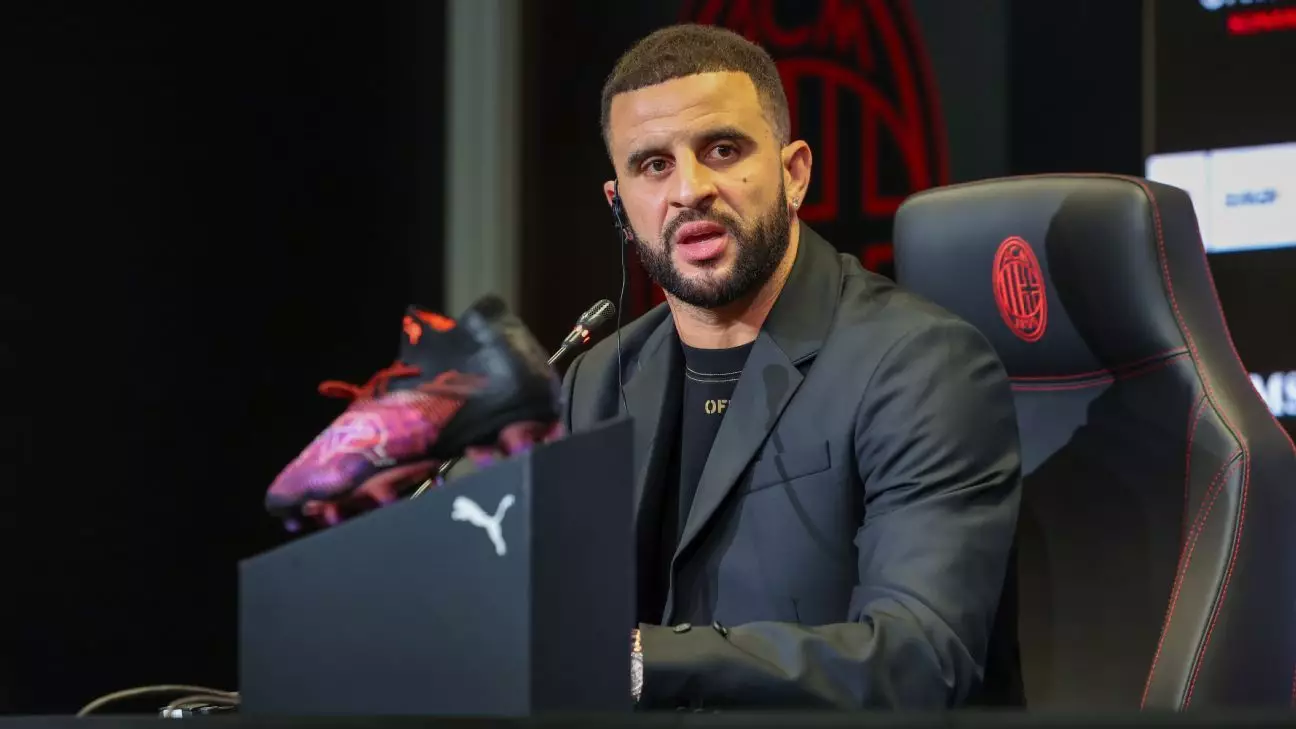The world of football is characterized by its relentless pace and the constant quest for growth, both personally and professionally. A vivid testament to this principle is Kyle Walker’s recent transfer from Manchester City to AC Milan, a shift that signifies not just a geographical relocation but an aspiration for fresh challenges at a pivotal moment in his career.
In January, Walker, 34, approached manager Pep Guardiola, initiating what he described as an “uncomfortable conversation.” This term underscores the mutual respect and shared history between the two. Walker had been a mainstay in the Manchester City lineup, contributing significantly to their domination in English football with 319 appearances and an impressive haul of 17 trophies. However, the reality of his diminishing playing time — starting only nine matches in the current Premier League season — spurred him to seek a new opportunity abroad.
Walker’s admission of feeling unable to secure regular minutes highlights the competitive nature of elite football, especially in a club overflowing with talent like City. It reveals a critical aspect of player development: the necessity of consistent playing time to maintain form and confidence. By seeking a loan to AC Milan, Walker is not only aiming to reinvigorate his career but also:
– **Seek new challenges:** The desire to compete in a different league, notably Serie A, illustrates a broader ambition to test himself against varied styles and competition.
– **Move beyond comfort zones:** The transition from a club where he has achieved so much to an entirely new footballing environment signifies a willingness to adapt and evolve, vital traits for sustaining longevity in a sport where performance is continually scrutinized.
Milan’s interest in Walker reflects their confidence in his capabilities, with Zlatan Ibrahimovic, a club advisor, vocally praising his character and on-field experience. The veteran striker’s remarks underscore how Walker’s influence extends beyond simple metrics of talent; his leadership qualities and adaptability add intrinsic value to Milan’s squad.
Furthermore, the endorsement from a player with Ibrahimovic’s pedigree speaks volumes about Walker’s potential impact at the San Siro. His attributes as a defender blend tactical discipline with an innate ability to drive play forward, characteristics that can be pivotal in propelling Milan back to the upper echelons of both Serie A and European football. The club is currently positioned seventh in their domestic league and sixth in the Champions League standings, thus, Walker’s arrival comes at a crucial juncture for both his personal aspirations and the club’s ambitions.
Beyond the football pitch, Walker faces the challenge of acclimatizing to life in Milan. He has expressed intentions to learn Italian, indicating his commitment not just to integrate into the team but also to embrace the culture. This initiative highlights an often-overlooked aspect of a player’s transition: cultural adaptation. Moving to a new country involves navigating not only the language but also social norms and expectations, which can be daunting.
His decision to wear the No. 32 jersey in homage to David Beckham reflects Walker’s recognition of the legacy associated with the club and his determination to leave his own mark. This connection to history is vital for a player entering a storied club like AC Milan, with a rich narrative intertwined with successes and legendary figures.
Kyle Walker’s transfer to AC Milan represents a decisive moment in his career. It is a courageous choice that illustrates a desire for growth and acceptance of new challenges. His journey echoes in the broader football narrative where players must navigate their careers with an eye toward both present conditions and future aspirations.
As Walker embarks on this new chapter, the expectations are twofold: personal performance and contributing significantly to AC Milan’s quest for glory. With his prior accomplishments at Manchester City, he not only joins a new club but steps into a role that could heavily influence the trajectory of both his career and the fate of a historic football franchise seeking resurgence. Football remains a game of the now, but it is the bold moves and hard choices that often define the legacy of its players.

